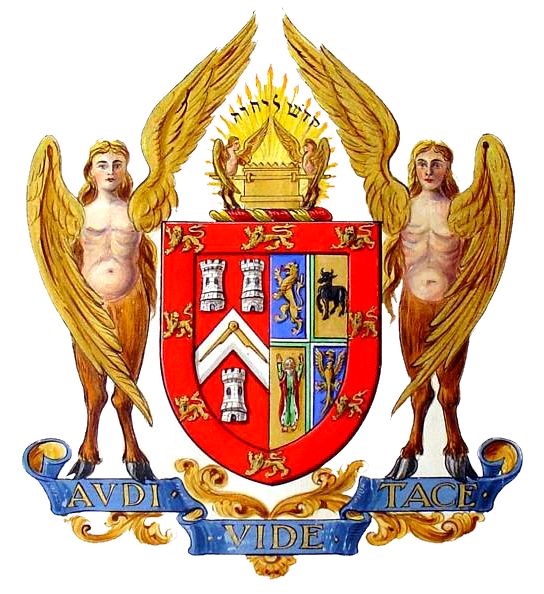United Grand Lodge of England: Difference between revisions
Knorrepoes (talk | contribs) No edit summary |
Knorrepoes (talk | contribs) No edit summary |
||
| Line 14: | Line 14: | ||
The arms were officially granted on July 19, 1919. | The arms were officially granted on July 19, 1919. | ||
The arms of the Grand Lodge are partially based on the arms granted to the [[Worshipful Company of Masons|Masons' Company]] in 1472. The other half of the shield shows the Arms of the Atholl Masons. The Atholl Masons were a fraction of Masons, which became part of the Grand Lodge. The Atholl Masons made use of the emblems of the four Evangelists :<br> | |||
1. Mark: a lion — indicative of one who, prior to this contact with Christianity, was weak but later became strong. It symbolically expresses resurrection and courage.<br> | |||
2. Luke : a bull — an animal used for sacrifice — symbolic of sacrifice and renunciation.<br> | |||
3. Matthew : a man — symbolic of incarnation.<br> | |||
4. John : an eagle — the Ascension of Christ — symbolic of immortality.<br> | |||
Between the four Evangelists stands the Cross. | |||
The bordure shows the tincture and lions of England. | |||
The crest is a combination of the motto of the Atholl masons and an Ark, a reference to the Mosaic antiquity of the Craft. The cherubs face one another (Exodus 25:20) and guarded and denoted Divinity. They were also used in the decoration of King Solomon's Temple. | |||
{{media}} | {{media}} | ||
[[Literature]] : | [[Literature]] : Rothwell, 1955. | ||
[[Category:Institutional heraldry of the United Kingdom]] | [[Category:Institutional heraldry of the United Kingdom]] | ||
[[Category:Granted 1919]] | [[Category:Granted 1919]] | ||
Revision as of 10:44, 13 January 2019
| Heraldry of the World |
| British heraldry portal Civic heraldry of the United Kingdom |
|
UNITED GRAND LODGE OF ENGLAND
Official blazon
Arms : Per pale gules and quarterly azure and Or, dexter on a chevron between three castles argent a pair of compasses extended of the third, sinistea cross quarterly of the fourth and vert between in the first quarter a lion rampant of the third, in the second an ox passant sable, in the third a man with hands elevated proper vested of the fifth the robe crimson lined with ermine, and in the fourth an eagle displayed also of the third; the whole within a bordure of the first charged with eight lions passant guardant of the third.
Crest: On a wreath of the colours, A representation of an Ark supported on either side by a cherub proper, with the motto over in Hebrew characters "Holiness to the Lord".
Supporters: On either side a cherub proper.
Motto: Audi, vide, tace
Origin/meaning
The arms were officially granted on July 19, 1919.
The arms of the Grand Lodge are partially based on the arms granted to the Masons' Company in 1472. The other half of the shield shows the Arms of the Atholl Masons. The Atholl Masons were a fraction of Masons, which became part of the Grand Lodge. The Atholl Masons made use of the emblems of the four Evangelists :
1. Mark: a lion — indicative of one who, prior to this contact with Christianity, was weak but later became strong. It symbolically expresses resurrection and courage.
2. Luke : a bull — an animal used for sacrifice — symbolic of sacrifice and renunciation.
3. Matthew : a man — symbolic of incarnation.
4. John : an eagle — the Ascension of Christ — symbolic of immortality.
Between the four Evangelists stands the Cross.
The bordure shows the tincture and lions of England.
The crest is a combination of the motto of the Atholl masons and an Ark, a reference to the Mosaic antiquity of the Craft. The cherubs face one another (Exodus 25:20) and guarded and denoted Divinity. They were also used in the decoration of King Solomon's Temple.
Contact and Support
Partners:
Your logo here ?
Contact us
© since 1995, Heraldry of the World, Ralf Hartemink 
Index of the site
Literature : Rothwell, 1955.












